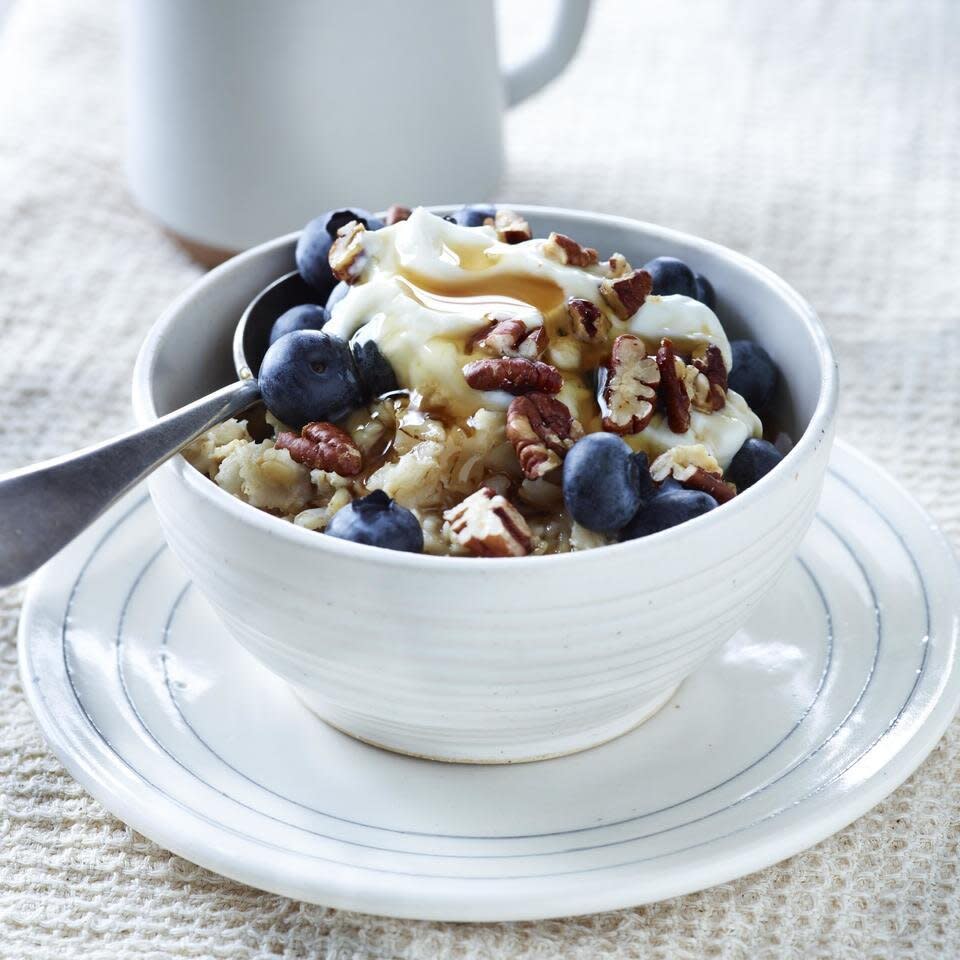8 Top Anti-Inflammatory Foods for Anxiety
One-third of Americans will experience prolonged anxiety at some point in their lives, according to the National Institute of Mental Health, and symptoms include things like difficulty sleeping, worry about routine things, trouble concentrating, irritability and headaches or stomach issues. While in the past treatment has largely focused on medication and therapy, research now suggests food and nutrients should play a role too.
This stems from the fact that inflammation is often a root cause or underlying contributor to anxiety, as well as many other mental health issues. Wondering how inflammation impacts our brain and how we feel? Here's a quick overview:
Chronic inflammation causes changes in brain communication and neurotransmitter functioning that affects mood, emotional reactions and memory.
These changes can trigger new—or exacerbate existing—symptoms of anxiety, depression or other mental health issues.
Continued diet and lifestyle habits may contribute to additional inflammation. This, along with a lack of key nutrients, creates a cycle that further disrupts the brain's ability to communicate properly and create needed neurotransmitters.
Eating more foods that reduce inflammation and supply brain-specific nutrients has the potential to improve anxiety symptoms. Try adding these eight anti-inflammatory foods to your diet to see if they help.
1. Almonds
Low magnesium levels are associated with an increased likelihood of both anxiety and depression. Research suggests that increasing magnesium intake can ease anxiety, and almonds are a top source (a 1-ounce serving provides 20% of the Daily Value). Other good sources of magnesium are cashews, peanuts and leafy greens like spinach and beans. Try whipping up a batch of homemade granola and sprinkling in a few extra nuts.
2. Eggs
Eggs are a quick, high-quality source of protein and the anti-inflammatory nutrient choline. Choline is a component of acetylcholine, a key neurotransmitter involved in memory and mood, and low choline levels are associated with higher anxiety levels. Two eggs contain 50% DV for choline, as well as other anti-inflammatory nutrients that impact brain communication like vitamin B12, selenium and zinc.
3. Salmon
Higher intakes of the long-chain omega-3 fatty acids DHA and EPA are associated with lower risk of anxiety but may also ease existing anxiety. These fatty acids ease neuroinflammation in the brain, as well as enhance neuron communication. DHA and EPA are only found in fish with a higher fat content like salmon, sardines, mackerel and sea bass, so try to get two to three servings a week of these. Fish oil supplements are another way to get these fatty acids, but research is inconclusive as to if they are as effective as eating seafood.
4. Probiotic-Rich Foods
Gut health influences the ability for inflammation to develop, which means it also influences risk for mental health issues like anxiety. Strengthening the gut's microbe barrier by eating certain "good" bacterial strains helps by preventing inflammatory compounds from entering the body, which may decrease anxiety. Research is limited and not all good bacteria have an effect, but two foods that do appear to help anxiety are fermented foods—such as sauerkraut and kimchi—and dairy products that contain Lactobacillus rhamnosus.
5. Asparagus
Did you know that asparagus extract is an approved functional food used for anxiety in China because of its anti-anxiety effects? Researchers aren't clear exactly why it works, but some speculate that the vegetable's folate content plays a role since the body uses metabolized folate to make certain neurotransmitters. High levels of antioxidants like vitamin C and beta carotene also help to reduce neuron inflammation. Get your fix with our delicious Garlic-Parmesan Asparagus.

6. Blueberries
Oxidative stress creates new inflammation, and both anxiety and depression are associated with lower antioxidant levels in the body. This suggests that a lack of antioxidants from food may lead to inflammation that can potentially trigger new—or exacerbate existing—mental health issues. Eating antioxidant-rich foods is vital, and blueberries are packed with polyphenolic compounds that act as antioxidants to protect brain cells from free radicals. These compounds also promote proper brain functioning, particularly during stressful periods, and ease neuroinflammation.
7. Spinach
According to a recent study, leafy greens like spinach have high levels of nutrients specifically associated with mental health. This makes them a top choice to help prevent and to ease conditions like anxiety and depression. These nutrients include minerals like folate and magnesium, but also include vitamin C and beta carotene, which ease current inflammation and prevent oxidative stress.
8. Lean Animal Proteins
Inadequate intake of vitamins B6 and B12 can contribute to mental health issues like anxiety since they are needed to make neurotransmitters like serotonin and dopamine that control mood and cognition. Getting adequate intake of B6 and B12 can be difficult, but lean animal proteins like beef, pork and chicken are a good source of both, along with zinc and the antioxidant selenium, both of which also impact brain health. This doesn't negate the positive benefits seen from eating more plant proteins, but look for ways to incorporate lean animal proteins two to three times per week.
Carolyn Williams, Ph.D., RD, is author of the new cookbook Meals That Heal: 100+ Everyday Anti-Inflammatory Recipes in 30 Minutes or Less and a culinary nutrition expert known for ability to simplify food and nutrition information. She received a 2017 James Beard Journalism award. You can follow her on Instagram @realfoodreallife_rd or on carolynwilliamsrd.com.

